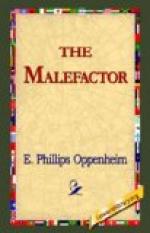“Heaven knows,” Barrington answered. “It is you who have chosen to seek us out. You have forced upon us something which has at least the semblance of friendship. There is no one else whom I could ask. It isn’t only this damned Stock Exchange transaction. Everything has gone wrong with me for years. If I could have kept going till next July, I should have been all right. I have made a little success in the House, and I am promised a place in the next government. I know it seems queer that I should be asking you, but it is that—or ruin. Now you know how things are with me.”
“You are making,” Wingrave said quietly, “a mistake. I have not pretended or given the slightest evidence of any friendship for yourself.”
Barrington looked at him with slowly mounting color.
“You mean—”
“Precisely,” Wingrave interrupted. “I do not know what I might or might not do for Lady Ruth. I have not considered the subject. It has not, in fact, been presented to me.”
“It is the same thing,” Barrington declared hoarsely.
“Pardon me—it is not,” Wingrave answered.
“What I ask you to do,” Barrington said, “I ask on behalf of my wife.”
“As an ambassador,” Wingrave said coldly, “you are not acceptable to me. It is a matter which I could only discuss with Lady Ruth herself. If Lady Ruth has anything to say to me, I will hear it.”
Barrington stood quite still for several moments. The veins on his forehead stood out like tightly drawn cords, his breath came with difficulty. The light in his eyes, as he looked at Wingrave, was almost murderous.
“If Lady Ruth desires to see me,” Wingrave remarked slowly, “I shall be here at nine o’clock this evening. Tomorrow my movements are uncertain. You will excuse me if I hurry you away now. I have an engagement which is already overdue.”
Barrington took up his hat and left the room without a word. Wingrave remained in his chair. His eyes followed the departing figure of his visitor. When he was absolutely sure that he was alone, he covered his face with one hand. His engagement seemed to have been with his thoughts for he did not stir for nearly an hour later. Then he rang the bell for Aynesworth.
IN THE TOILS
Wingrave did not speak for several moments after Aynesworth had entered the room. He had an engagement book before him and seemed to be deep in its contents. When at last he looked up, his forehead was furrowed with thought, and he had the weary air of a man who has been indulging in unprofitable memories.
“Aynesworth,” he said, “be so good as to ring up Walters and excuse me from dining with him tonight.”
Aynesworth nodded.
“Any particular form of excuse?” he asked.
“No! Say that I have an unavoidable engagement. I will see him tomorrow morning.”
“Anything else?” Aynesworth asked, preparing to leave the room.




